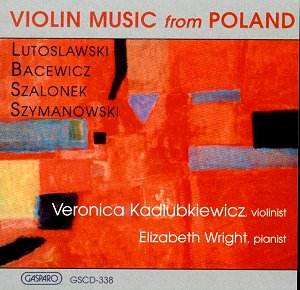This is a fine disc
that draws together some threads in
Polish violin composition. Each is a
significant work in its own right –
only the Szalonek is less than well
known – and occupies its own stylistic
place in the scheme of twentieth century
compositional life. The Szymanowski
doesn’t lack for partisan support on
disc – Oistrakh prominently among those
who have left us versions (currently
on Testament) and there is a convincing
recording as well from Mordkovitch on
Chandos as well as a number of other
competitors. This recording will not
efface memories of Oistrakh’s patrician
tonal glory necessarily but there is
considerable poetry and subtlety in
Kadlubkiewicz and Wright’s performance.
Bacewicz’s Second Sonata
for solo violin dates from 1958 and
was premiered by the composer herself
– an excellent player by all accounts
– in Cracow the following year. It’s
a formidably constructed work in sonata
form constructed essentially in two
parts with variational form embedded
into the syntax. Idiomatic – of course
– and consistently colourful, forward
moving and exciting this is a work that
compels admiration. The doublestop section
is especially persuasive and there is
some driving spiccato action that sounds
breathtaking. The technical demands
are considerable, the sudden ff
passages abrupt and stentorian – but
the rewards considerable. Incidentally
Bacewicz recorded quite a lot of her
own music, including this sonata, for
Muza – I believe the Third Concerto
was recorded on 78s and she also recorded
her one-time sponsor Szymanowski’s Prelude
Op. 1 No. 1 in her own arrangement.
Will some enterprising company consider
releasing this long buried treasure?
Lutosławski’s
Partita was completed in 1984 and premiered
by Zuckerman and Neikrug the following
year. It’s also known in its guise for
orchestra and piano obbligato, which
was written for Anne-Sophie Mutter four
years later. Concise, formally laid
out and full of dance and colour,
the dense though harmonically lucid
opening movement draws one in, amazed
at its balance of the technical and
the expressive. By contrast the almost
otherworldly ad Libitum second and fourth
movements – really small interludes
– evoke the sound almost of birdsong
(listen to the violin’s scurry over
the piano’s deliberation in the second
of these interludes). Kadlubkiewicz
and Wright respond splendidly to the
drama and the fissure of the work’s
finale, as indeed they do to the concentrated
poetry elsewhere.
Finally we have the
most recent, and least well known, the
Chaconne-Fantasie by Witold Szalonek,
born in Czechowice in 1927. Polyphonic,
paying oblique homage to Bach and to
Chopin, Szalonek has the power and the
confidence in his technical resources
to strip his drama down to deeply concentrated
single notes before building up the
material once again in driving rhetoric.
He ends the work in powerful reflection
– a work worth getting to know.
Notes are in English
and Polish in separate booklets and
this enterprise reflects highly on company
and artists.
Jonathan Woolf
The
entire Gasparo Catalogue may now be
purchased through MusicWeb
